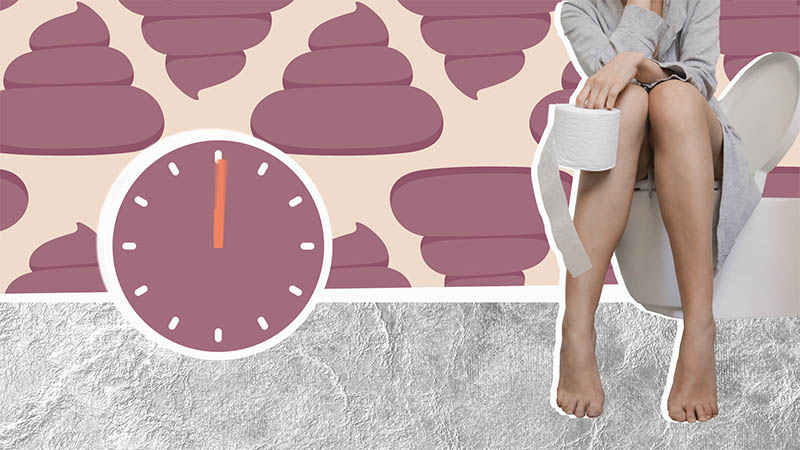As a living, breathing, eating human being, there’s a good chance that you’ve had trouble pooping at one point or another. Maybe you’ve suffered for days from constipation—feeling backed up and uncomfortable—and the longer it lasts, the worse it gets (and the worse you feel).
While it usually (thankfully) resolves on its own—or with a little help from extra fibrous foods or a stool softener—it’s important to know that there is a cutoff for how long you can go without pooping before you should see a doctor to see what’s up down there. Here’s what you need to know, according to gastroenterologists.
How often should you poop?
There’s no one right answer to this question; instead, a “normal” pooping schedule is really determined on a case-by-case basis, Rabia De Latour, MD, a gastroenterologist at NYU Langone, tells Health. For some people, being “regular” can mean pooping twice a day while for others pooping three times a week is normal, according to the National Institutes of Health.
Ideally, if you’re drinking enough water every single day, you should be having a bowel movement every single day, Dr. De Latour explains. That said, many Americans don’t drink enough water, and even if you are doing everything you can to stay hydrated, you might not go to the bathroom every single day, like clockwork.
Dr. De Latour adds that—while there’s a range, and not pooping for even three days might be extremely atypical for some people—going eight days without a bowel movement is thought to be concerning, no matter the patient’s regular pooping schedule.
When should you see a doctor about not pooping?
This too depends on your body and how often you usually go to the bathroom. If you usually poop every three or four days, then you notice it’s been five days since you pooped, you might not feel the need to seek medical help just yet. However, if you usually go once and day, not pooping for five days might be cause for concern.
If you’re constipated and concerned about it, take some time to reflect on your recent lifestyle habits to try to get to the cause of the constipation, Christine Lee, MD, a gastroenterologist at Cleveland Clinic, tells Health. Let’s say you went on a new diet on Sunday and then didn’t poop until Thursday, for example—that might tell you something about the foods you’ve been eating. (Specifically, you might not be getting enough fiber).
Another thing to consider is whether you’ve taken any new medications within the past few days, since many can contribute to constipation, like some blood pressure and pain management medications. But if you haven’t changed anything in your normal routine, you might have to talk to your doctor about what may have caused your constipation and what the best treatment option is for you.
If you experience any of the following in conjunction with constipation, you should see a doctor immediately, according to the NIH: blood in stool, constant abdominal pain, bleeding from rectum, fever, vomiting, not being able to pass gas, unexplainable weight loss, and lower back pain.
What can happen if you go too long without pooping?
A number of dangerous scenarios can play out if you ignore your constipation and don’t seek medical help, Dr. De Latour warns. For starters, it’s possible to experience something called a bowel perforation, which occurs when stool is so backed up that it essentially pokes a hole through the wall of your bowel. However, bowel perforations typically don’t occur in healthy young people, Dr. De Latour adds.
Being constipated can also result in an intestinal obstruction, also known as a bowel obstruction. This occurs when stool or food cannot proceed through the intestines, and it can cause severe pain among other symptoms like swelling in the abdomen, bloating, and vomiting, per MedlinePlus, a resource from the US National Library of Medicine (USNLM).
Another concern is the development of diverticulosis and then, subsequently, diverticulitis, Dr. Lee says. Diverticulosis occurs when diverticula, little bulges in the colon wall, appear. While this doesn’t necessarily need to be treated, it can cause diverticulitis, a condition that occurs when the diverticula become swollen and infected and can cause severe pain if not treated promptly.
What can you do if you’re having trouble pooping?
If your only cause for concern is that you haven’t been to the bathroom in a while—and you aren’t experiencing any other uncomfortable symptoms—there are a number of things you can do to help your body relieve itself. For starters, consider changing up your diet to include foods that can help you poop, Dr. Lee says. Among these are prunes, prune juice, bran, and high-fiber foods like broccoli, raspberries, and apples.
You might also want to try some over-the-counter laxatives, but, as always, make sure you take the recommended amount. Another thing to keep in mind is your activity level: Being sedentary can cause constipation. Therefore, if you’re having a hard time using the bathroom, consider getting out and going for a walk or taking the stairs to get things moving.
If you haven’t pooped in a long time and are feeling severe pain as well, it’s definitely time to go to the doctor and get checked out. If you go to an emergency room or urgent care center because you’re constipated, your doctor might suggest that you switch up your medicine routine if they suspect a medication you took caused your constipation.
If you’re suffering from one of the aforementioned consequences of constipation, such as a bowel perforation, you may need to undergo surgery. On the less intense end of the treatment scale is an enema, a treatment that involves inserting a tube into the anus to hopefully make it easier for for the body to relieve itself.


